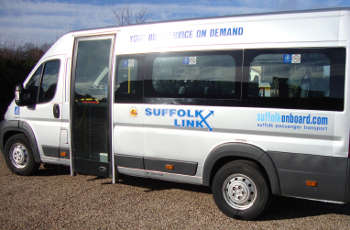Demand responsive transport (DRT) can help plug gaps in bus services caused by cuts but may not offer a good alternative for younger people, according to Transport Focus.

Suffolk Links runs demand responsive transport services in the county
In a new report, the passenger watchdog argues that ‘on demand’ bus services can provide a safety net and ensure there remains connectivity to high streets and for important trips such as medical appointments.
Transport Focus partnered with three county councils – Suffolk, Worcestershire and Hampshire – operating different models of DRT, provided under three different sections of the Transport Act 1985.
Users and non-users were asked about their views on community bus services and taxi share schemes.
It concluded that while DRT ‘can provide an attractive service, especially for older and disabled people…it is not clear that it currently offers a good alternative to conventional bus services for other transport users, especially younger people’.
David Sidebottom, Transport Focus passenger director, said: ‘As local authority supported bus services across the country face funding reductions, some areas are being left with little or no bus service at all. “On demand” services can provide an attractive alternative.
‘We urge local transport authorities to bear our findings in mind. Demand responsive transport services as an alternative to conventional bus services could be an effective solution but awareness and benefits of the schemes has to be actively promoted.’
The watchdog’s research found that DRT can offer a way of providing a service where one might not otherwise exist and make a limited contribution to meeting the transport needs of isolated communities, particularly if it is introduced as part of a wider review influenced by full public consultation.
The report noted that ‘reductions in service frequency tend to be accompanied by falls in patronage, so any financial savings to local authorities are often achieved at a cost’.
But it added that ‘it may be possible to both save public money and increase passenger numbers if a wider reorganisation is carried out’.
Writing in the Guardian, Leeds CC leader Judith Blake said it was 'critical that the Bus Services Bill now provides complete clarity about the switch to a franchising model, and a clear distinction between that and the existing partnership model'.
Like other council leaders, Ms Blake said franchising should 'be available to all local and combined authorities, regardless of whether they have a directly elected mayor'.
Register now for full access
Register just once to get unrestricted, real-time coverage of the issues and challenges facing UK transport and highways engineers.
Full website content includes the latest news, exclusive commentary from leading industry figures and detailed topical analysis of the highways, transportation, environment and place-shaping sectors.
Use the link below to register your details for full, free access.
Already a registered? Login